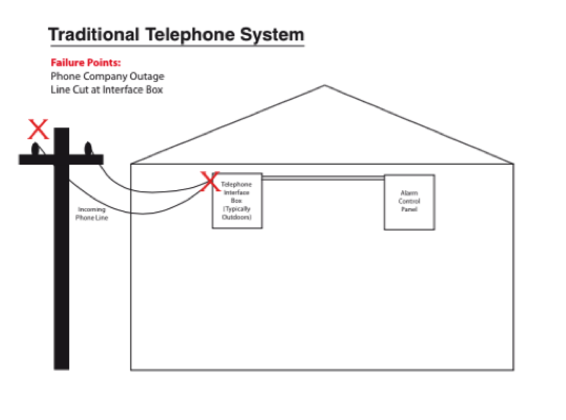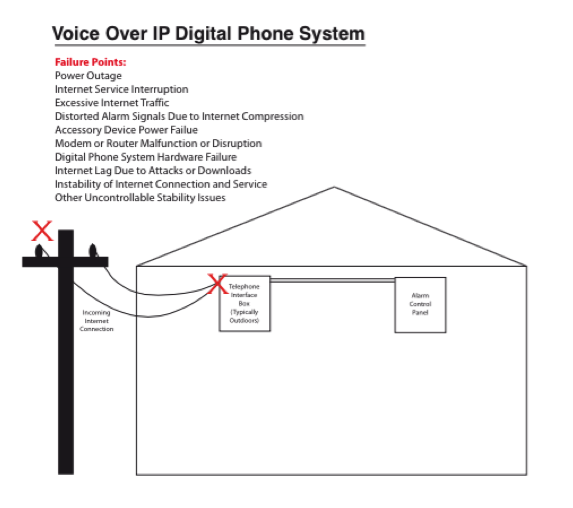Critical Communication Systems
Policies and Concerns for Security, Elevator, Fire Alarm, and other Critical Communications Systems when using digital phone systems.
Disclaimer: The term “digital phone” as used within this document refers to a generic VoIP phone infrastructure and layout. The term does NOT refer to the Digital Phone service offered by Time Warner Cable or Time Warner. The Digital Phone service is a trademark of Time Warner Communications.
There are certain weaknesses pertaining to Voice Over Internet Protocol (VoIP) Digital Phone Service and how it can affect security and fire alarm system communication. VoIP service is much different than classic Plain Old Telephone Service (“POTS”) telephone lines in that it routes phone traffic through a digital converter, then over the Internet. When compared with a POTS line, new concerns are introduced that could affect the stability and dependability of burglar or fire alarm system communication. Plain old telephone service, or POTS, is the service available from analogue telephones prior to the introduction of electronic telephone exchanges into the public switched telephone network. These services had been available almost since the introduction of the telephone system in the late 19th century. This list will help reduce the possibilities of failure wherever possible by educating you (the end user) and presenting possible solutions. Any solutions you wish to use are your sole responsibility.
1. Power Supply
Problem: The VoIP modem can come as a stand-alone network device, or a combination broadband modem/router/and VoIP converter. This raises new concerns for power supply, as regular phone lines are powered from the Telco company. If the power fails during a storm, blackout, or local electrical problem, the security system will be unable to communicate due to no Internet phone service.
Solution: A backup battery solution must be in place so that the modem can operate under power failure situations. Uninterruptible Power Supplies (UPS) can be purchased from any electronics store, and all network equipment should be protected and placed on battery backup. This includes any routers, modems, any facilities required to be on for the network to function, and the VoIP device as well.
2. Electronics Failure
Problem: The VoIP modem, router, any firewall in place, or broadband modem can lock up or lose signal due to buggy or defective hardware. This could result in the loss of Internet connectivity or an unresponsive connection. A cable may become unplugged and result in loss of Internet connectivity or digital phone service.
Solution: All hardware must be replaced if faulty, or different hardware purchased if a connectivity problem continues. All hardware should be checked for operation constantly, and, to minimize the chance of loss of alarm monitoring, should be replaced as soon as possible in the event of failure. All cables should be checked and inspected to verify proper Internet and digital phone service operation.
3. Loss of Internet Connectivity
Problem: The modem could lose signal or connectivity to the Internet, resulting in loss of digital phone service. This could occur for many reasons, including, but not limited to, internet service provider down-time due to problems or maintenance, storm-caused problems or damage, lag-time caused by high internet or local Ethernet traffic, loss of signal due to malicious attacks or network traffic, and the such.
Solution: Most of the time, these problems are out of control of the digital phone customer, and the dependability of the phone service can be down for minutes, or hours, resulting in no alarm communication. A backup communication route should be explored, the most reliable being the Cellular Backup Service, which relies on the cellular band network and is not affected by VoIP problems such as cut phone wires or loss of Internet connectivity. These options should be considered as a reliable backup system in the event that any failure is encountered by the VoIP service.
4. Loss of power to accessory devices
Problem: VoIP phone service is often tied into an office or business’s existing network wiring for practical purposes. If a network device connected to the existing network loses power due to an electrical outage or device failure, this means the phone service may be rendered unavailable and any alarm system may not be able to communicate effectively during the failure.
Solution: Consider Uninterruptible Power Supplies for all accessory devices and be certain to consider each and every device that would require power for the phone system to be operational. Consider contacting your Information Technology provider and asking them which devices should be on battery backup so that you can reduce the chances of phone failure in the event of a power outage.
5. Instability of Digital Phone Service Quality
Problem: We will do everything possible to fully test the alarm signals and program the system for maximum protection against compression artifacts and other problems that could occur while alarm signals are traveling along the digital phone system. However, this does not mean that VoIP service will transmit alarm signals at a 100% success rate. A VoIP system is highly dependent on other factors such as Internet traffic, internet hops, lag time, and other concerns which could garble or drop your alarm signals, possibly inhibiting alarm communication.
Solution: This should be kept in mind when purchasing digital phone service as well as the consideration of a backup transmission method, such as Cellular Backup Service. Once the alarm signals are converted into digital signals and are traveling across the Internet network, anything may happen to the data to keep it from reaching the central station. Much like a lost email, lost file transmission, or Internet connection problem, this could mean that something as urgent and important as a fire alarm or panic alarm would not be received at the central station due to internet routing problems. It is strongly advised to consider Cellular Backup service due to the unstable and uncontrollable factors that could render alarm communications useless.
Conclusion
Placing a battery backup solution, checking and inspecting all equipment, and replacing components as soon as possible if bad are some things that can be done to reduce the probability of failing alarm system communications. However, as described in this article, there are many factors which simply are out of control or non-serviceable for the customer. Much care should be taken to protect and preserve what communications exist using digital phone service, however, a backup plan should be highly considered for a system that protects property, and especially for a system that protects life and property by means of police, fire, and medical panic alarms or automatic fire alarm protection. Cellular Backup Service will allow the customer to retain their digital VoIP service and benefits, while having their alarm system or life safety system connected to a more reliable, dependable communications network that is fully supervised 24 hours a day and will alert the customer to the fact if connectivity is dropped. Contact your alarm provider to see if they offer Cellular Backup Service. The following diagrams show differences between traditional telephone systems and VoIP systems.


